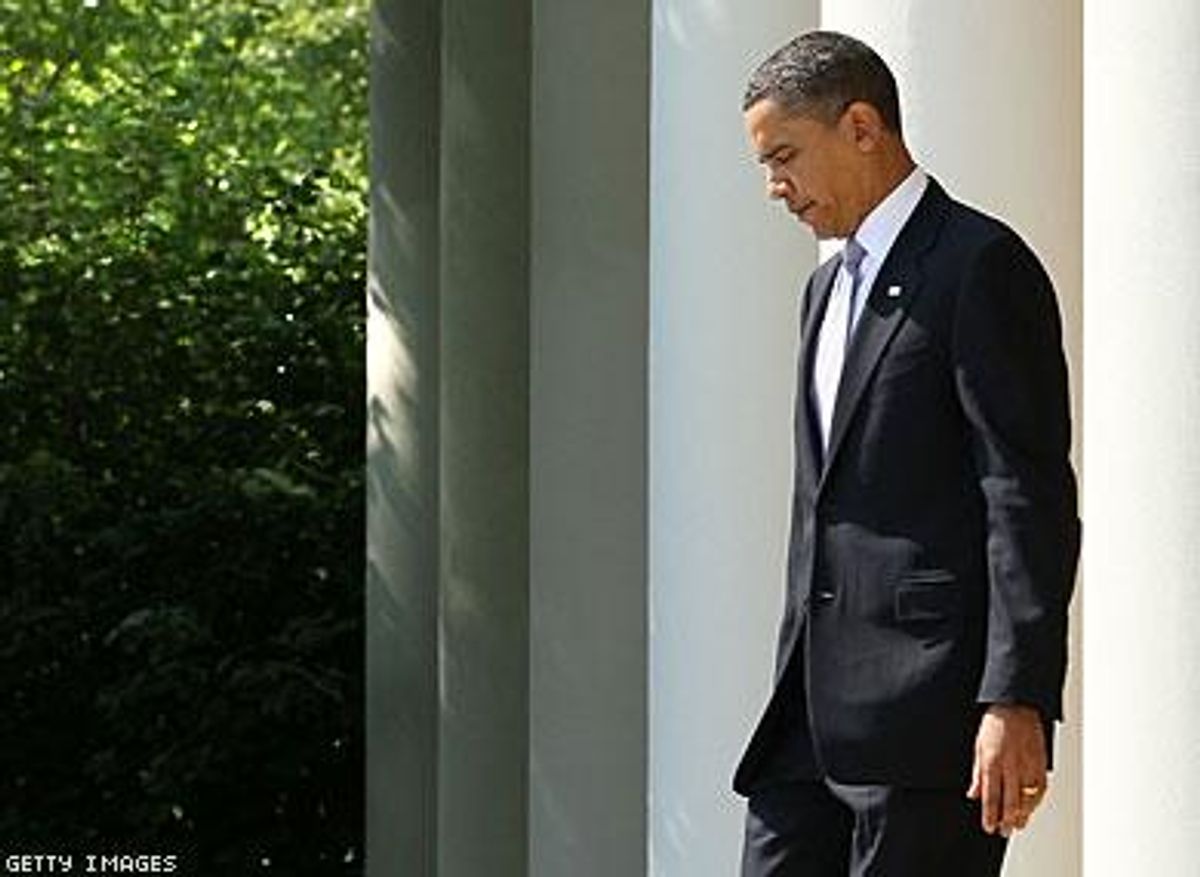World
Constitutionality Queries Dog Obama
Constitutionality Queries Dog Obama

By continuing to use our site, you agree to our Private Policy and Terms of Use.
Constitutionality Queries Dog Obama

Over the past week the White House has been besieged by a persistent line of questioning about President Barack Obama's view on the constitutionality of "don't ask, don't tell" and, as yet, has continually failed to supply an answer that satisfies the nagging question, Does the president of the United States believe the law is constitutional?
White House press secretary Robert Gibbs stammered through a response to four separate inquiries last week, giving the final dodge Sunday on NBC's Meet The Press.
"You know, David, he thinks it's discriminatory and it's unjust and most of all it harms our national security," Gibbs told NBC's David Gregory after being asked point-blank whether the president believes the law is unconstitutional.
When Gibbs faced the query once again from The Advocate Tuesday during what will be his only official briefing this week due to the president's travel schedule, he appeared a bit beleaguered by the topic.
"Again, I have enumerated for you the belief, the President's belief that it's unjust, it's discriminatory, and that it harms our national security," he offered.
The Advocate responded, "Well, you've never enumerated for us his belief on the constitutionality of it," to which Gibbs conceded, "I haven't," before hustling along to the next reporter.
The answer is important, of course, because it's the linchpin to understanding both whether and potentially how the Department of Justice should defend the law. Though the Justice Department is charged with defending laws passed by the Congress in most cases, it is not compelled to do so in cases where the law in question is deemed to have violated the constitution. In fact, the commander in chief holds the power to instruct his Justice Department not to defend such a law.
President Obama addressed the matter once in 2009, during a July interview with CNN, where he suggested that the law is constitutional but stopped short of affirmatively saying he personally believed it was.
"If Congress passes a law that is constitutionally valid, then it's not appropriate for the executive branch simply to say, we will not enforce a law," Obama told CNN's Anderson Cooper.
Although one could seemingly reasonably deduce the president's belief based on the fact that his Justice Department filed an appeal last week of Judge Virginia Phillips's ruling that the policy is indeed unconstitutional, it is not necessarily predictive, according to some legal scholars.
During a conference call Monday, Walter E. Dellinger III, solicitor general for the Clinton administration in 1996 and 1997, explained that government lawyers could agree to "nominally defend" the law even as they argue that the government finds it unconstitutional.
Dellinger said he believed that simply allowing a federal judge's ruling
to strike down the law stand would be a weak legal decision.
"It
shouldn't be that easy for a president to personally set aside an act
of Congress," he said during the call, which was sponsored by the
National LGBT Law Association.
But Dellinger added that the
administration could still leave the final decision to the courts even
as it presents its own belief that "don't ask, don't tell" is
unconstitutional.
"If the president believes that a restriction
is harmful to national security ... then surely from the president's own
viewpoint it's unconstitutional, and he ought to feel free to tell the
court that," he said, noting about 10 instances in the post-World War II
era in which a president has followed that very same course.
Richard
Socarides, a New York lawyer and former LGBT adviser to President Bill
Clinton, took Dellinger's point a step further and said he believes President Obama has already "boxed himself in" based on his declaration that the law harms national security. In other words, it's very difficult to find a rational basis for discriminating against gays and lesbians if the law doesn't make the nation safer.
"The
legal test for whether the law can pass constitutional scrutiny is
predicated on a determination that it serves some national interest,"
Socarides explained. "So the fact that the president says that it's not
in our national security interests is actually the rough equivalent of
saying that the law is unconstitutional."
Once the government
concedes that point, he added, "the duty to defend evaporates."
Dellinger
was subtler but made a similar point toward the end of Monday's call.
To say "we think it's very harmful to the national security but to go
into court and argue it's constitutional seems like arguing that two
plus two equals three," he concluded.
Nonetheless, Socarides said he did not expect the Obama administration to argue in court that the law is unconstitutional.
"I think the White House shows no signs that they are even considering altering their strategy of aggressively defending this law in every way possible," he said.